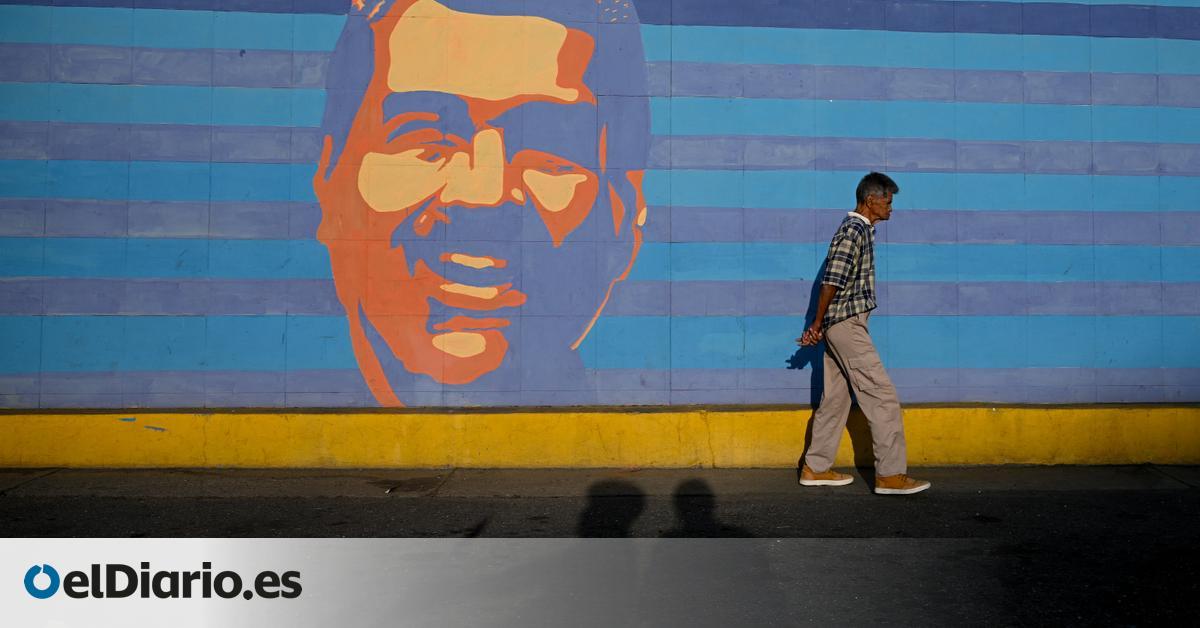
More than five months after the last elections in Venezuela, and with the imminent inauguration of Nicolás Maduro this Friday, the tension and uncertainty after the elections, far from dissipating, has increased. This Thursday, María Corina Machado has reappeared in Caracas. And he has done so with much confusion. Her party, Vente Venezuela, denounced that the opposition leader was “violently intercepted” after her departure from the protest she called this Thursday to demand the victory of Edmundo González Urrutia in the presidential elections. “Regime members shot at the motorcycles that were transporting her,” Vente Venezuela indicated in the publication.
A couple of hours later, however, the opposition leader’s team acknowledged that she was free: “Leaving the concentration in Chacao, Caracas, María Corina Machado was intercepted and knocked off the motorcycle she was riding on. Firearms detonated in the event. They took her away by force. During the period of her kidnapping, she was forced to record several videos and was later released. In the next few hours she will address the country to explain the facts.”
Telesur and the Venezuelan Government broadcast a video in which Machado claimed to be free.
Diosdado Cabello, Minister of Interior Relations, responded: “She is crazy about us capturing her, and that was her plan: to say that she was captured, to see what she can do. It didn’t generate anything, and when he saw that it didn’t generate anything, he recorded a video with his tail between his legs saying that it’s okay, that he lost his blue wallet. An invention, a lie! “Enough of the lies against the country and our people!”
Later, Machado herself stated in by bullet when the repressive forces of the regime detained me. I am now in a safe place and with more determination than ever before to continue with you until the end. Tomorrow I will tell you what happened today and what is coming.”
Complex panorama
The panorama looks complex. Nicolás Maduro remains in the same position since July 28: prepared to take office and defending his victory in the presidential elections, endorsed by the National Electoral Council (CNE). despite not having made public the minutes that would confirm it.
Meanwhile, the opposition Edmundo González Urrutia says he is not willing to give up the presidency, for which he has the support of countries such as the US and Argentina, which have recognized him as “elected president” – while the EU has remained in place not to recognize the Maduro’s triumph -, of partial copies of electoral documents – today kept in Panama – that, the opposition claims, certify his victory, and of the reports of UN observers and the Carter Center that question the electoral result proclaimed by the CNE .
González Urrutia, who left Venezuela in September to seek asylum in Spain, and who began a tour of America a few days ago to meet with allied leaders, assures that this Friday he will arrive in Venezuela to take office as president-elect. The Minister of the Interior of Venezuela, Diosdado Cabello, warned him this Monday that “as soon as he lays a finger in Venezuela he will be arrested.”
Meanwhile, Maduro has everything planned to revalidate his mandate in an act that will feature the absence of several leaders, such as Pedro Sánchez or Gustavo Petro, who have already confirmed that they will not attend the inauguration.
Both the opposition and organizations have denounced repression and a wave of arrests in recent weeks. This Tuesday, the police arrested González Urrutia’s son-in-law and opposition leader María Corina Machado stated on her social networks that official forces had surrounded her mother’s house.
The Espacio Público organization warned that since Tuesday the whereabouts of its director, press freedom defender Carlos Correa, have been unknown. The Inter-American Commission on Human Rights (IACHR) accused the Maduro government on Tuesday of carrying out harsh repression in recent months, with “at least 25 murders, dozens of brief forced disappearances, some 2,000 arbitrary detentions, torture and cruel treatment.” , inhuman and degrading.”
Maduro has assured this week that in recent months they have arrested more than 150 foreign people, whom he described as “mercenaries” for being involved in conspiring to overthrow his Government.
“In these months since the election we have a much more surrounded ruling party and a more repressed opposition,” Carmen Beatriz Fernández, a Venezuelan expert in political communication and professor at the University of Navarra, explains to elDiario.es. “The tension has been growing as January 10 approaches,” he adds.
The “impossible mission” of the opposition
Within the uncertainty that is palpable in the country, analysts and journalists consulted by this medium see one certainty as of this Friday: nothing will prevent Maduro from taking office.
“The entire bureaucratic and institutional apparatus of the State is participating in the swearing-in of Nicolás Maduro,” says Víctor Amaya, director of the Venezuelan media TalCual. Regarding González Urrutia’s promise to arrive in Venezuela this Friday, Amaya is skeptical: “It is very unlikely. What is presumed is that he is in a nearby country so that, in the event that certain events occur, he can reach Caracas.”
These “events” would involve something that the opposition has been seeking since the elections: that the armed forces and police disobey the orders of the Chavista leadership and in this way Maduro cannot take office, something that González Urrutia himself has requested this week.
Popular support is also key for the opposition. The Caracas demonstration was replicated in several countries, such as Spain and Italy. In Madrid, at Puerta del Sol, Isabel Díaz Ayuso called on the Venezuelan armed forces to “take a step forward” and “precipitate the fall of Maduro’s criminal regime” in a protest that Feijóo, Abascal and Aznar have joined.

The possibility of a negotiation
For Carmen Benítez, there is still a possibility that Nicolás Maduro will not take office. It would go through a possible negotiation in extremis to favor a withdrawal by the president. This is something that has been on the table since the elections of July 28, 2024, and that governments such as Colombia, Brazil and Mexico have sought without success so far.
Whether now or later, other analysts share the Venezuelan expert’s analysis. “What Venezuela needs to get out of this deep crisis is a face-to-face negotiation where, with realism, both parties determine an agreed transition,” Chilean diplomat and professor Fernando Reyes Matta told EFE.
Edmundo González as Guaidó?
For some analysts, it is inevitable to think that Edmundo González’s situation will lead to something similar to what happened with Juan Guaidó in 2019: an opposition leader who at the time had popular and international support and who the government of Nicolás Maduro managed to extinguish.
In January 2019, months after a presidential election in which Maduro revalidated his mandate, despite allegations of fraud by the opposition, Juan Guaidó, newly appointed president of the National Assembly, proclaimed himself interim president of Venezuela. At the beginning, Guaidó had the support of several governments in America and Europe but, despite this support, after the Venezuelan Government withdrew his immunity and he was disqualified, the politician began to lose strength.
The European Union and the opposition itself stopped calling him “president” and at the end of 2022, a majority of opposition parties decided to eliminate the “Interim Government.” Guaidó left the country in April 2023, heading to Miami, where he lives with his family. Shortly after his departure, the Prosecutor’s Office issued an arrest warrant against him.
Although some analysts remain cautious when comparing both opponents, others do not see the possibility of the same thing happening with González Urrutia that happened with Guaidó as distant. “I believe that Edmundo González is going to become a new (Juan) Guaidó,” Patricio Navia, a political scientist and university professor, told EFE.
“It is not the same scenario,” Víctor Amaya warns this medium. The difference for the journalist is that the process for González Urrutia to become president is based on a popular election.
“There is evidence that there was electoral fraud, that the result was changed and it is supported by official documents from the National Electoral Council, with security systems, as certified by institutions such as the Carter Center,” concludes Amaya.
Source: www.eldiario.es
